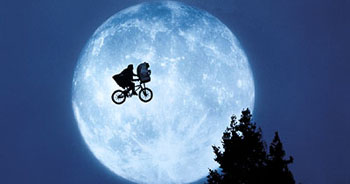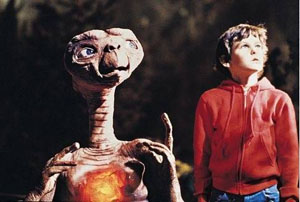|
The world loves Steven Spielberg. They love him with the sort of unreasoning blindness that almost no other filmmaker has ever managed to attain. They even love him in spite of the fact that from time to time he will suck-1941 was made right smack dab between Close Encounters and Raiders of the Lost Ark, and is now largely forgiven or outright forgotten, whereas his pal George Lucas will likely never live down the single character of Jar Jar Binks. I've no answer. I certainly have no answer for why E.T.: The Extra-Terrestrial became the highest-grossing film ever in its day (and for many years to come), because it absolutely did not deserve it, much in the way that Titanic similarly not deserve it some fifteen years subsequent. But I'll say this: Titanic deserved it more than did E.T.. 
The basic premise of the film is fine, and an obvious example of exactly what Spielberg was doing in those days; it seems almost an attempt to recapture the whole "awe and wonder" aspect of Close Encounters on a smaller scale. Unfortunately, he also felt the need to make it cute in a way that gets pretty cloying for non-kids, or even kids who aren't insipid little moppets. Everyone knows the story: Elliot, middle child in a fractured family drifting through the lingering vestiges of the '70s malaise, finds an abandoned alien creature hiding out in his backyard and befriends the bug-eyed critter, who must find a way to contact his spacecraft for a rescue mission before the extended stay on Earth finally does him in. It has promise. It has excellent photography, and good performances. The animatronic alien effects were top-notch for the day, and still look pretty decent. It's also crassly manipulative. While all films manipulate the audience to some degree, E.T. does it in such a way (or ways) that one cannot help but notice it, and it feels like a series of obvious and cheap shots at pulling heartstrings. Really, honestly, Spielberg can do better than this. He had already developed a reputation for working with kids, and I honestly don't mind that he made them the central characters in this one, but I do mind that he apparently felt that the film therefore had to be chock-full of enormous buckets of sap. "Sap, you say?" complains the apparently English dissenter. "You obviously have no sense of youthful wonder." Bullshit. I've personally embraced adulthood about as enthusiastically as I would embrace a barrel cactus. I understand the intended point of the film. I get Elliot perfectly fine-it's a quintessential childhood desire to discover something strange and secret and all your own, waiting up late in the dark, flashlight in hand, for the world to reveal itself as much more exciting than it generally lets on; every kid who's ever sneaked into the requisite neighborhood haunted house has always hoped to actually see a ghost, and is invariably disappointed rather than relieved to find little more than cobwebs, rat droppings and passed-out horse addicts. The problem is that Spielberg and writer Melissa Mathison don't seem to know when enough is enough, or, for that matter, way too much. Finding an alien lifeform is all on its own pretty damned wonderous. They fail to exercise any restraint, however, and following the discovery of E.T., we then learn, in no particular order, that: the aliens' hearts light up like lanterns (and when they're afriad, no less; one must conclude that there are apparently no predators of any kind on their homeworld, or that their primitive ancestors developed the shotgun before the wheel). Their fingertips also light up with the power to magically heal your boo-boos. They can make your bicycle fly through the air, because on their home planet, the laws of physics were repealed as being such a total buzz-kill. They are so sweet and peaceful and down with nature that plants burst into bloom when they walk by. Perhaps birds suddenly appear every time they are near, as well. But honestly, Jesus Christ. There's a reason no one ever actually dumps an entire five-pound bag of sugar into his or her mouth; why would we want the metaphorical equivalent? By the time the Christmas-ball spacecraft has streaked across the sky, leaving a rainbow in its wake, the onset of diabetic shock can be enough to kill a man. Where was the subtlety the man had shown with Jaws? Perhaps the production on E.T. went too smoothly; we might do well to remember that Spielberg had fully intended to show shark shots aplenty in Jaws before being stuck with a mechanical shark that broke down constantly. Maybe Spielbergian subtlety is unfortunately relegated to the accidental. 
It's unfortunate, really, that the good parts of this film are repeatedly strangled by ham-fisted sentimentality. Perhaps it was the doldrums of the era that made people swallow the film with such enthusiasm, but the filmmakers overreach themselves in an attempt to be uplifting. There's an honesty in the scene where the government researcher sincerely tells Elliot, "He [E.T.] came to me, too," in response to the sick boy's impassioned cries of violation by the larger world. There's a blatant dishonesty in having the alien creature be just plain magical, as if some perfectly normal, albeit freaksome-looking, stranded visitor would be somehow less deserving of sympathy. It also doesn't help that the entire premise hangs on what is essentially a false dilemma. I've had cause to wonder just what exactly was in that message that E.T. was desperately attempting to send, and can't help but feel that it might well have run to something such as "To all my dearest colleagues: thanks so much for presuming me dead for absolutely no reason and failing to send any kind of rescue mission, ASSHOLES." Really, why do the aliens initially flee from the approach of the government investigators with such fear that they won't even wait for all hands to return, only to land their ship right in front of half the town, including those exact same G-men, after E.T.'s message gets through and shames them into coming back for him? I'm sorry that Spielberg has this need, as do so many filmmakers who aim their wares at the broad audience, to pound his point home with such force that it veritably implies that the viewer is an idiot. It seems as though he and his writer didn't trust in the strength of the core premise, and had to dress it up in such silly frippery to substitute for the very real power such an encounter would have for nearly anyone. I'm reminded of the yokels who appear on the evening news every time a tornado touches down and narrowly misses their home and family, and who have to ascribe some overarching divine meaning to it all instead of simply being glad to have survived; it's unnecessary, and just plain lame. -review by Matt Murray
|
|
||||||||